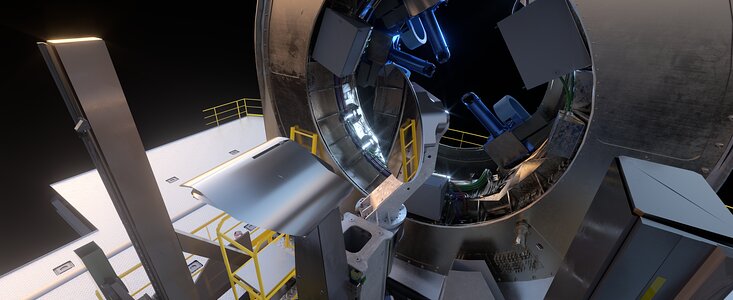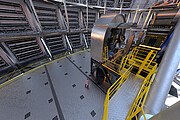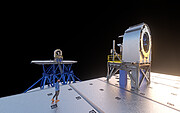Announcement
Contract signed for the ELT’s second prefocal station as design for the first close to approval
6 November 2020
A major component of ESO’s Extremely Large Telescope (ELT), its first prefocal station or PFS-A, is now close to completing its final design review. With this milestone nearly reached, ESO has signed a contract with Spanish company IDOM for a second prefocal station, PFS-B.
The two ELT prefocal stations, which are designed and manufactured by IDOM, are large structures measuring over 9 metres tall and each standing on supporting platforms, located on opposite sides of the telescope main structure. Working at the interface between the telescope’s five-mirror system and its instruments, they have a triple function: control the telescope mirror alignment (including the precise pointing on-sky of the telescope structure), ensure the segmented main mirror continues to act as one, and distribute light to the telescope instruments.
Sensing starlight to check alignment
The ELT is extremely sensitive to very small changes in environmental conditions, which will shift the mirrors out of alignment, degrading observations. Gravity can pull the mirrors out of shape as the telescope moves. In addition, small changes in temperature cause the telescope’s metal structure to expand slightly by hundreds of micrometres, again shifting the positions of the various ELT mirrors.
The PFS-A and PFS-B analyse the light from ‘guide stars’ — natural, bright stars close to the object of study in the sky. The stations, which do not work simultaneously, will monitor up to three guide stars during observations, assisted by its three sensor arms positioned with accuracies of a few hundred micrometres. Information from the guide stars is used to actively position the mirrors and telescope main structure to control the telescope’s alignment during observations — a process known as active optics. This ensures that light remains properly focused and that the telescope remains pointed accurately at the target throughout observations.
798 segments acting as one mirror
An additional function of the PFS is to ensure that the hundreds of segments of the main mirror (M1) continue to act as one giant mirror. To achieve this, the relative positions of the 798 mirror segments must be accurate to tens of nanometres. However, the positions of the segments drift over time due to changes in temperature and gravity loads so they need to be corrected periodically. The PFS will regularly control the shape of M1 using the guide star measurements to maintain its optimal shape.
Distributing light
Finally, the PFS is also used to distribute the light collected by the telescope to the various scientific instruments and auxiliary equipment, depending on which system is being used at any given moment. The platforms where the PFS A and B stand will host multiple scientific instruments, specialising in analysing the light collected by the telescope to answer our questions about the Universe. The PFS will direct the light to the select scientific instrument using a large flat mirror. It is also the last component before the light arrives at the telescope focus, giving the station its name.
A successful collaboration
Following two years of work by engineers at IDOM and at ESO on the complex PFS-A, the teams are now very close to successfully completing the design activities and will soon begin manufacturing this crucial telescope component. In addition, ESO, through its Director General Xavier Barcons, and IDOM, through their president Luis Rodríguez, have now signed a contract for the Spanish company to develop and supply the second prefocal station for the ELT.
ESO’s ELT, made possible by high-tech engineering solutions and many talented people, will answer the biggest astronomical questions of our time, from investigating the Universe’s history to finding and studying Earth-like planets outside our Solar System. The telescope will sit atop Cerro Armazones in the Chilean Atacama Desert and will start operations later this decade.
Contacts
Steffan Lewis
ESO
Garching bei München, Germany
Tel: +49 89 3200 6931
Email: slewis@eso.org
Bárbara Ferreira
ESO Public Information Officer
Garching bei München, Germany
Tel: +49 89 3200 6670
Email: pio@eso.org
About the Announcement
| Id: | ann20029 |
Our use of Cookies
We use cookies that are essential for accessing our websites and using our services. We also use cookies to analyse, measure and improve our websites’ performance, to enable content sharing via social media and to display media content hosted on third-party platforms.
ESO Cookies Policy
The European Organisation for Astronomical Research in the Southern Hemisphere (ESO) is the pre-eminent intergovernmental science and technology organisation in astronomy. It carries out an ambitious programme focused on the design, construction and operation of powerful ground-based observing facilities for astronomy.
This Cookies Policy is intended to provide clarity by outlining the cookies used on the ESO public websites, their functions, the options you have for controlling them, and the ways you can contact us for additional details.
What are cookies?
Cookies are small pieces of data stored on your device by websites you visit. They serve various purposes, such as remembering login credentials and preferences and enhance your browsing experience.
Categories of cookies we use
Essential cookies (always active): These cookies are strictly necessary for the proper functioning of our website. Without these cookies, the website cannot operate correctly, and certain services, such as logging in or accessing secure areas, may not be available; because they are essential for the website’s operation, they cannot be disabled.
Functional Cookies: These cookies enhance your browsing experience by enabling additional features and personalization, such as remembering your preferences and settings. While not strictly necessary for the website to function, they improve usability and convenience; these cookies are only placed if you provide your consent.
Analytics cookies: These cookies collect information about how visitors interact with our website, such as which pages are visited most often and how users navigate the site. This data helps us improve website performance, optimize content, and enhance the user experience; these cookies are only placed if you provide your consent. We use the following analytics cookies.
Matomo Cookies:
This website uses Matomo (formerly Piwik), an open source software which enables the statistical analysis of website visits. Matomo uses cookies (text files) which are saved on your computer and which allow us to analyze how you use our website. The website user information generated by the cookies will only be saved on the servers of our IT Department. We use this information to analyze www.eso.org visits and to prepare reports on website activities. These data will not be disclosed to third parties.
On behalf of ESO, Matomo will use this information for the purpose of evaluating your use of the website, compiling reports on website activity and providing other services relating to website activity and internet usage.
Matomo cookies settings:
Additional Third-party cookies on ESO websites: some of our pages display content from external providers, e.g. YouTube.
Such third-party services are outside of ESO control and may, at any time, change their terms of service, use of cookies, etc.
YouTube: Some videos on the ESO website are embedded from ESO’s official YouTube channel. We have enabled YouTube’s privacy-enhanced mode, meaning that no cookies are set unless the user actively clicks on the video to play it. Additionally, in this mode, YouTube does not store any personally identifiable cookie data for embedded video playbacks. For more details, please refer to YouTube’s embedding videos information page.
Cookies can also be classified based on the following elements.
Regarding the domain, there are:
- First-party cookies, set by the website you are currently visiting. They are stored by the same domain that you are browsing and are used to enhance your experience on that site;
- Third-party cookies, set by a domain other than the one you are currently visiting.
As for their duration, cookies can be:
- Browser-session cookies, which are deleted when the user closes the browser;
- Stored cookies, which stay on the user's device for a predetermined period of time.
How to manage cookies
Cookie settings: You can modify your cookie choices for the ESO webpages at any time by clicking on the link Cookie settings at the bottom of any page.
In your browser: If you wish to delete cookies or instruct your browser to delete or block cookies by default, please visit the help pages of your browser:
Please be aware that if you delete or decline cookies, certain functionalities of our website may be not be available and your browsing experience may be affected.
You can set most browsers to prevent any cookies being placed on your device, but you may then have to manually adjust some preferences every time you visit a site/page. And some services and functionalities may not work properly at all (e.g. profile logging-in, shop check out).
Updates to the ESO Cookies Policy
The ESO Cookies Policy may be subject to future updates, which will be made available on this page.
Additional information
For any queries related to cookies, please contact: pdprATesoDOTorg.
As ESO public webpages are managed by our Department of Communication, your questions will be dealt with the support of the said Department.






